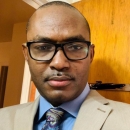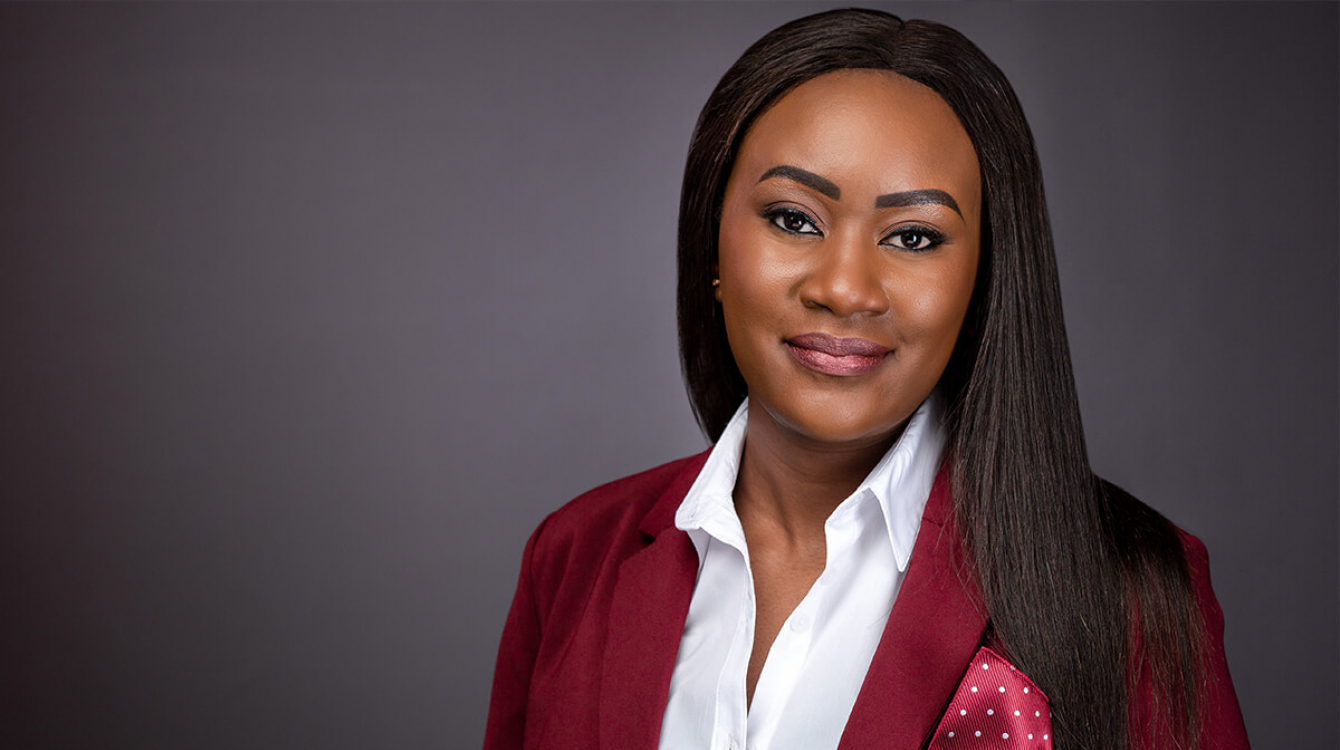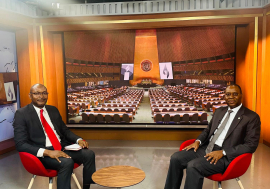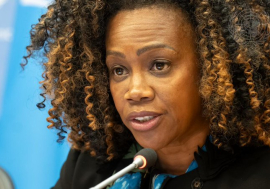In November 2021, the African Union Commission (AUC) Chairperson Moussa Faki Mahamat announced the appointment of Chido Cleopatra Mpemba of Zimbabwe as the AU Envoy for Youth for a two-year term. Ms. Mpemba is the second person to assume the role that was created in 2018. Ahead of International Youth Day on 12 August, she spoke with Africa Renewal’s Kingsley Ighobor about her priorities, her hopes for the global climate talks (COP27), and the legacy she hopes to leave behind. These are excerpts from the interview.
First, why are you here at the UN headquarters in New York?
I'm here as the African Union Youth Envoy. And that's part of efforts being made to ensure that young people are at the forefront of development. I was invited by the UN Economic and Social Council (ECOSOC) President [AmbassadorCollen Vixen Kelapile] to participate in a special high level dialogue roundtable discussion. I spoke about Agenda 2063 and the Africa We Want, in line with the Sustainable Development Goals. It is also part of strengthening the partnership between the AU and the UN. So, it's been amazing. I've been hosted by the AU Permanent Observer to the UN, Ambassador Fatima Kyari Mohammed. I also received support from the office of the Deputy Secretary-General.
You were appointed the AU Youth Envoy a few months ago. What are your priorities?
My priorities include focusing on the young people across Africa and ensuring that I amplify their voices in all the 55 member states of the African Union. On policy, we advocate for youth voices at the decision-making table. I am honoured to have the opportunity to present the needs of young Africans before the relevant bodies. I get to ensure that when we speak on issues that affect Africa—whether it’s post-COVID recovery, education, or unemployment—that the proposed solutions take into account the needs of young people who constitute the largest population segment in Africa.
Is there anything that has surprised you so far in your work?
Let me focus on the positive aspect of what has surprised me. Everywhere I've been, I hear young people's voices. I've been surprised also to see many advocates for young people, including decision-makers and policy experts. And they are doing great things across the continent. They have many best practices that we could replicate to drive the agenda to achieve the Africa that we want.
What's come up the most is youth livelihoods. They also want us to focus on accelerating efforts on tackling issues related to climate change and adaptability, climate finance, and climate education.
What are young Africans telling you?
I am doing listening tours at the moment. I have visited many communities in Africa. And my office recently carried out a digital survey to learn about the priorities of young people over the next two years. What's come up the most is youth livelihoods. They also want us to focus on accelerating efforts on tackling issues related to climate change and adaptability, climate finance, and climate education, to name a few.
How do you organize your dealings with young people in individual countries?
My office is very open. I'm working with a team of volunteers. I would say that 80 per cent of these volunteers reached out to me on social media. I intentionally take time to speak to young people on social media and give them opportunities within my office.
Outside of that, we have the AU structure. For example, we have representatives of the various member states and youth groups at the AU Commission in Addis Ababa. We have young people working with the Regional Economic Communities. For example, we have the ECOWAS [Economic Community of West African States] youth groups, the SADC [Southern African Development Community] youth groups, and the East Africa Community (EAC) youth groups. We disseminate information to these groups. We shouldn't forget about the marginalized community. I'm hoping we can reach out to youths with disabilities and those in disadvantaged communities, ensuring they also get the message because not everyone has access to digital information, which goes back to the rationale for our listening tours and the community engagements.
You mentioned livelihoods. I think employment is a part of that. How bad is the unemployment situation of young people in Africa?
Currently, we face a huge unemployment challenge. We need to bridge the skills gap and prepare the youth for the labour market. There are not enough jobs for young people. We need to find innovative ways to create employment opportunities. In addition, when we speak about entrepreneurship, it is about empowering the youth to become job creators so that they can help foster economic development on the continent.
After your listening tours, what next?
The purpose of the listening tours is to inform young people about the mandate of the office of the AU Youth Envoy and our Plan of Action. It is also to present to policymakers what we heard on the ground so that when we lobby, we lobby based on evidence on the ground. In addition, we plan to have a publication that we will leave as a legacy that people can always go back to and say, through the countries we visited, this is what came out as the voices of young people, including best practices that could be replicated.
You mentioned that young people are talking about the climate crisis. COP27 will take place in Egypt this year. What do you expect from the conference?
I expect young people to be at the forefront of efforts to address the climate crisis. We should have the needs of young people at the forefront when it comes to climate adaptation and climate financing. We must also have opportunities for young Africans to innovate and provide climate solutions. For COP27, I am hoping there is a youth advisory board to ensure that the needs of young people are fully represented.
Why should youths in Africa care about climate change?
Because we are being affected by the climate crisis. Globally, everyone is affected by climate change; but in Africa, we are affected in a unique way. Take deforestation and the lack of access to water because of drought. There's food insecurity because bad weather conditions affect agriculture. And so much more. As I mentioned before, because we're the largest demographic in Africa, we must be at the forefront of discussions on climate change.
I'm glad that the African Union appointed African Youth Peace Ambassadors for the various regions in Africa. And we've been having consultations regarding a Continental Framework on Youth, Peace and Security. As I speak, Youth Peace Ambassadors are in Nigeria to consult on that framework and to assist in rolling out a national action plan on peace and security.
Let’s talk about peace and security in Africa. How do conflicts in countries affect young people?
It affects us a lot because conflicts interrelate with other challenges. They affect the economy. They affect social dynamics. And a lot can be done in this regard. I'm glad that the African Union appointed African Youth Peace Ambassadors for the various regions in Africa. And we've been having consultations regarding a Continental Framework on Youth, Peace and Security. As I speak, Youth Peace Ambassadors are in Nigeria to consult on that framework and to assist in rolling out a national action plan on peace and security. I will be heading to Zimbabwe straight from here [New York] as part of that process.
In terms of political leadership and policy decisions, young Africans are demanding a seat at the table. How much progress is being made in this regard?
My role itself speaks to progress. My position was created within the African Union. Again, I believe more needs to be done. Currently, I'm advocating for African leaders to appoint youth advisers. I hope that, in the coming years, more leaders will appoint youth advisors within their offices.
In terms of representation and inclusion of youth at the executive level, there is a challenge of young people not having the required experience for these roles. But we often forget that we come with innovation, unique expertise and a willingness to learn.
You are a young woman yourself. In your work, do you pay special attention to issues that affect girls?
Yes. It's something dear to my heart. I'm very passionate about issues that affect young girls, and within my office currently, we have plans for programmes that focus on young girls because we have a responsibility to ensure that our future generation, including the young girls, are empowered.
For young people worldwide, my message is that the future is in our hands. We must act now. We must influence decisions that affect us.
I assume it's not all been smooth sailing for you. What challenges have you faced so far?
The office of the AU Youth Envoy was created less than four years ago. I'm the second youth envoy. Therefore, we need to continue to lay a solid foundation for this role. It’s a challenge that comes with mobilising capacity and resources for a full-fledged office. It's also an opportunity because this is our time as Africans to shape what we'd like the continent to be, and I believe we can do so.
What would success look like for you when you complete your tenure?
It is building a legacy for young people that goes beyond me, something continuous so that the next youth envoy will meet a strong foundation. It is ensuring that there are best practices in place that can be replicated in Africa and indeed globally.
The world will be marking International Youth Day on 12 August. What is your message to young people globally, particularly those in Africa?
For young people worldwide, my message is that the future is in our hands. We must act now. We must influence decisions that affect us. To young people in Africa, I say we constitute a large share of our population and it's important that we harness our potential to build the Africa that we want.


























